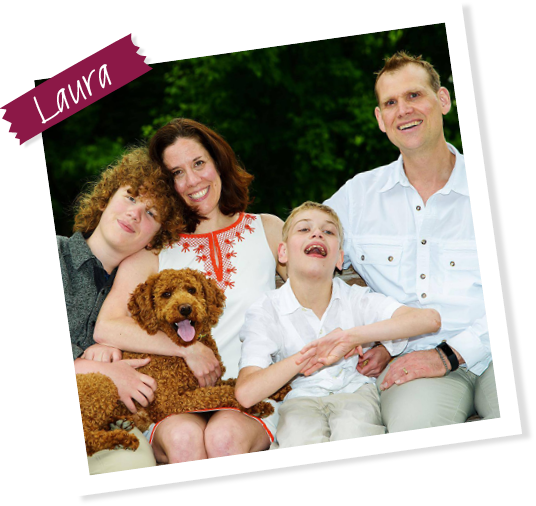Laura W
 I am a mother of two and have spent my career working with patients and families in health care settings. My younger son Bryson is 14 years old and has a rare neurodevelopmental genetic condition called GRIN1. He is an amazing young man, full of smiles and hugs. He is also non-verbal, non-ambulatory and has seizures and neurostorming episodes. When Bryson was diagnosed with GRIN1 four years ago, there were only a few others we could find through social media. Through the creation of the CureGRIN Foundation, and increased genetic testing globally, this number has grown to over 1,000.
I am a mother of two and have spent my career working with patients and families in health care settings. My younger son Bryson is 14 years old and has a rare neurodevelopmental genetic condition called GRIN1. He is an amazing young man, full of smiles and hugs. He is also non-verbal, non-ambulatory and has seizures and neurostorming episodes. When Bryson was diagnosed with GRIN1 four years ago, there were only a few others we could find through social media. Through the creation of the CureGRIN Foundation, and increased genetic testing globally, this number has grown to over 1,000.
We first noticed that Bryson wasn’t meeting his milestones when he was 3 months old. He had extremely low muscle tone and it was clear that his development would be significantly delayed. We had to take time to grieve what we thought our life would look like; and through the help of family and friends found a new normal to celebrate. Bryson’s early life was filled with appointments and I was filled with guilt about the kind of early childhood both my children were having as I shuffled them daily from appointment to appointment. I was also exhausted and filled with fear and sadness. I constantly asked myself: Would Bryson have a shorter life? Is he in pain? Is my older son feeling left behind? Would we ever find out the cause of his condition?
Through advocacy, producing a CBC podcast called Unlocking Bryson’s Brain, and starting a foundation called CureGRIN, our family and researcher connections began to grow significantly. We have a partnership with the University of Toronto and there are mice models that have Bryson’s, and other, GRIN changes. We have learned so much more about the underlying changes in Bryson’s neurology and physicians at Sickkids and Holland Bloorview Kids Rehabilition Hospital have helped us develop a tailored treatment plan. It’s not yet a cure but we have more confidence in how his symptoms are being managed.
With these new treatments, caregiving for Bryson has become more manageable although the physical stress is becoming more challenging – I’m not as young and fit as I used to be! During this journey, I have made new friends who also have children with disabilities. They are a lifeline and we can lay it all out on the table. One of the biggest fears we share is for the future. Every day, I ask myself: Who will take care of Bryson when I’m gone or no longer able to support his needs safely? Before COVID, we received 7 hours a week of home care – it simply wasn’t enough. We want Bryson to live with us as long as possible, but we need help. We also need to build a future community for him that doesn’t currently exist – there really are limited options for people with disabilities to live, grow and be part of a community that will embrace and care for him.
Having Bryson changed me as a person. He has taught me about patience, strength and humility. Patience as we wait and celebrate every little milestone; strength by watching him never give up; and humility from his vulnerability. As a family we are on a journey and we have a long road ahead. My commitment to Bryson is to help build a world around him that is safe, kind, and embraces the whole perfect person that he is.
